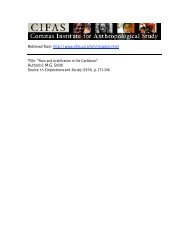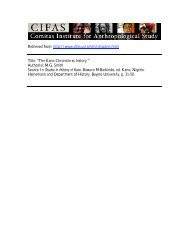e - CIFAS
e - CIFAS
e - CIFAS
Create successful ePaper yourself
Turn your PDF publications into a flip-book with our unique Google optimized e-Paper software.
18 GOVERNMENT IN ZAZZAU<br />
the operative system ofpolitical action consistsinrelations between<br />
the controlling and controlled groups. These conc1uaiom follow<br />
from the fact that politi.cal action and process are defined by the<br />
relarivity of power relations a.mong the competing components,<br />
and such relativism is neither consistent with an exhaustive concentration<br />
ofpower, nor with the cessation of political competition.<br />
What one does find historically are situations in which an overriding<br />
power is entrenched under conditions which permit autocracy<br />
or absolutism, but even in such conditions the component<br />
units of this overriding power compete among themselves for<br />
supremacy. Since political action is characteristically defined by<br />
and expressed through competition for power, it is in the final<br />
analysis, competition for the supreme power which is diacritical,<br />
that is, for the capacity to make decisions on policy affecting the<br />
total population ofthe unit concerned,<br />
In contrast with this inherently segmentary mode of political<br />
relations and activities, administrative action is overtly characterized<br />
by lack of formal contraposition at any level, having on the<br />
contrary an inherently hierarchic mode of organization. This contrast<br />
between political and administrative relations and actions<br />
merely reflects their contrary preoccupation with different values,<br />
forms, aspects, and problems ofsocial control, namely, with power<br />
and authority, in terms of which these two structures and processes<br />
are distinguished and defined. Just as political action is<br />
based and focused on the appropriation ofpower, so adminiStrative<br />
action derives from, and remains preoccupied with, authority<br />
and its problems. Thus the legality of new administrative procedures<br />
is conferred by virtue of the policy decisions tltese are intended<br />
to execute, and for which in some tlteories the administration<br />
is not ultimately responsible.!<br />
(b) Po"", and Authority<br />
The distinction between political and administrative action set<br />
out above derives from the distinction between power and<br />
authority. Authority is, in the abstract, the right to make a particular<br />
decision and to command obedience, since tlte act of command<br />
always involves at least one such decision. Power, in the<br />
abstract, isthe ability to act effectively on persons or things, to take<br />
1 This seems to have been om: of the points at issue in the Nuremberg trials,<br />
J945---7.<br />
THE NATURE OF GOVERNMENT 19<br />
or secure favourable decisions which are not of right allocated to<br />
the individuals or their roles,1 The modes of action by which<br />
power is expressed range from coercion and force through<br />
persuasion, influence, manipulations of various sorts and factors,<br />
bargaining, to simple suggestion or bluff. Substantively, authority<br />
is a derived or delegated right, while power is the possession of<br />
manifest or latent control or influence over the actions of persons<br />
including oneself. We frequently speak of authority as delegated<br />
'powers' when what we mean is a delegated right, as for instance<br />
when we talk of judicial or military powers, all of which are derived<br />
and delegated rights, in contrast to political power, Similarly,<br />
we often describe politically dominant groups or persons as<br />
authorities, for instance, when African rulers and chiefs are described<br />
as 'Native Authorities'. Whereas legitimacy in the sense of<br />
legality is crucial to the constitution and definition of authority or<br />
'power', power itself is not subject to such limitations.<br />
The confusions which result from imprecise conceptions and<br />
the improper use of tenns may be deliberate or accidental; but<br />
they are certainly numerous and important. If the essentials of<br />
government are power and authority, their initial confusion<br />
severely limits the chances of systematic analysis in this field, To<br />
sharpen the distinction between these principles, and point up the<br />
consequences of their confusion, a simple illustration will suffice.<br />
The command which an army officer issues to his subordinate is<br />
legally enforceable only if it is issued in accordance with the rules<br />
defining and governing the exercise and scope of the officer's<br />
authority. Should the command be ultra vires and none the less<br />
obeyed, the response reflects the officer's power, that is, his ability<br />
to control the subordinate and to influence him to make a favourable<br />
decision to carry out an order beyond the officer's scope of<br />
authority conferred.<br />
If we focus attention on the formal aspects ofthe differences be-<br />
1 It will be remembered that we defined authority as the right to take tertain<br />
decisions, whereas power is the ability to effect or secul'tlsuch dedsions as one<br />
wishes, although th~e riecisions are either not allocated II.S rights, or are the<br />
rights of other petlIons. Concretely this means that if A has authority to decide<br />
an issue involving B's interests 8I1d does so independendy of B, A exercisea an<br />
authority which appears to B as power. Ifon the other hand B is able to secure<br />
from A the deciSion that B desll"e8, then B has displayed power through A's<br />
authority. In many situations decisions have to be taken although there is no<br />
clear allocation of authOrity to make them. These decisions reveal. the play of<br />
power, but they are not the only llOrtS of decisions. governed by power. Cases<br />
like that of B influencing- A may well be far more important and usual.





